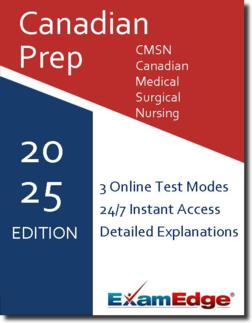CMSN- Canadian Medical-Surgical Nursing (CMSN) Practice Tests & Test Prep by Exam Edge - FAQ
Based on 40 Reviews
- Real Exam Simulation: Timed questions and matching content build comfort for your CMSN Canadian Medical Surgical Nursing test day.
- Instant, 24/7 Access: Web-based Canadian Medical Surgical Nursing Examination practice exams with no software needed.
- Clear Explanations: Step-by-step answers and explanations for your Canadian exam to strengthen understanding.
- Boosted Confidence: Reduces anxiety and improves test-taking skills to ace your Canadian Medical Surgical Nursing Examination (CMSN).

Why should I use Exam Edge to prepare for the Canadian Medical Surgical Nursing Examination Exam?
FAQ's for Exam Edge Canadian Medical Surgical Nursing Examination practice tests
- Comprehensive content: Exam Edge's Canadian Medical Surgical Nursing Examination practice tests are created specifically to prepare you for the real exam. All our CMSN Canadian Medical Surgical Nursing practice test questions parallel the topics covered on the real test. The topics themselves are covered in the same proportions as the real test too, based on outlines provided by the Canadian Nursing in their CMSN- Canadian Medical-Surgical Nursing test guidelines.
- Realistic practice: Our CMSN- Canadian Medical-Surgical Nursing practice exams are designed to help familiarize you with the real test. With the same time limits as the real exam, Our Canadian Nursing practice tests enable you to practice your pacing and time management ahead of test day.
- Detailed explanations: As you complete your practice tests, we show you which questions you answered correctly and which ones you answered incorrectly, in addition to providing you with detailed step-by-step explanations for every single Canadian Medical Surgical Nursing Examination practice exam question.
- Performance insights: After you complete a practice test, we provide you with your raw score (how many you answered correctly) and our estimate of the CMSN Canadian Medical Surgical Nursing score you would have received if you had taken the real test.
- Ease of access: Because all Our Canadian Nursing practice tests are web-based, there is no software to install. You can take CMSN- Canadian Medical-Surgical Nursing practice exams on any device with access to the internet, at any time.
- Flexible use: If you must pause while taking one of Our Canadian Nursing practice exam, you can continue right where you left off. When you continue the test, you will start exactly where you were, and with the same amount of time you had remaining.
- Thousands of unique questions: We offer 25 different online practice exams with 2,500 unique questions to help you prepare for your Canadian Medical Surgical Nursing Examination!
- Low cost: The cost of ordering 5 practice tests is less than the cost of taking the real CMSN- Canadian Medical-Surgical Nursing test. In other words, it would be less expensive to order 5 practice tests than to retake the real Canadian Medical Surgical Nursing Examination exam!
- Our trusted reputation: As a fully accredited member of the Better Business Bureau, we uphold the highest level of business standards. You can rest assured that we maintain all of the BBB Standards for Trust.
- Additional support: If you need additional help, we offer specialized tutoring. Our tutors are trained to help prepare you for success on the Canadian Medical Surgical Nursing Examination exam.
What score do I need to pass the CMSN Canadian Medical Surgical Nursing Exam?
To pass the Canadian Medical Surgical Nursing Examination test you need a score of 80.
The range of possible scores is 0 to 100.
How do I know the practice tests are reflective of the actual Canadian Medical Surgical Nursing Examination?
At Exam Edge, we are proud to invest time and effort to make sure that Our Canadian Nursing practice tests are as realistic as possible. Our practice tests help you prepare by replicating key qualities of the real test, including:
- The topics covered
- The level of difficulty
- The maximum time-limit
- The look and feel of navigating the exam
Do you offer practice tests for other Canadian Nursing subjects?
Yes! We offer practice tests for 11 different exam subjects, and there are 215 unique exams utilizing 21500 practice exam questions. Every subject has a free sample practice test you can try too!
CDRE - Canadian Dietetic Registration Examination
Canadian Dietitian Registration Exam (CDRE)
Practice Tests
Canadian Nursing Exams
Canadian Cardiac Vascular Nursing (CCN)
Practice Tests
Canadian Critical Care Nursing Examination (CNCC)
Practice Tests
CNCCP - Canadian Critical Pediatric Care (CNCCP)
Practice Tests
Canadian Family Nurse Practitioner Examination
Practice Tests
Canadian Gerontological Nursing Examination (GNC)
Practice Tests
Canadian Medical Surgical Nursing Examination (CMSN)
Practice Tests
CNPE: F/AA
Practice Tests
CPNRE (CPNRE)
Practice Tests
CPMHN - Canadian Psych/Mental Health Nursing (CPMHN)
Practice Tests
Canadian Registered Nurse Examination
Practice Tests
To order tests, or take a sample test, for a different subject:
Click on ' Name on the Exam Name' You will be take to the orders page
How do I register for the real Canadian Nursing?
For up-to-date information about registration for the Canadian Nursing, refer to the Canadian Nursing website.


